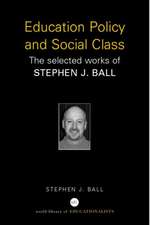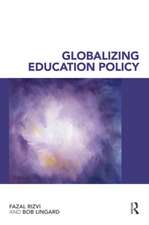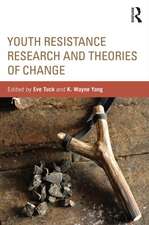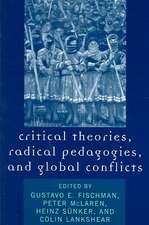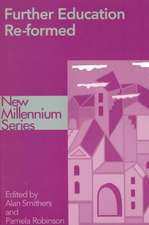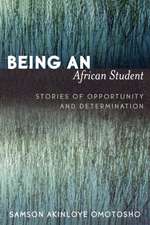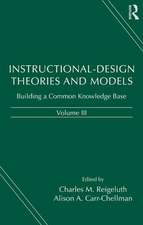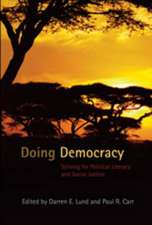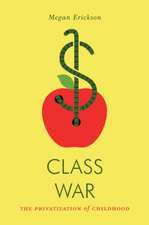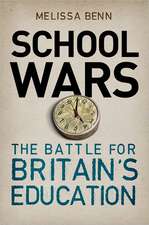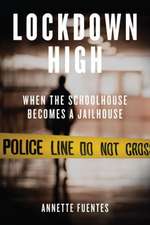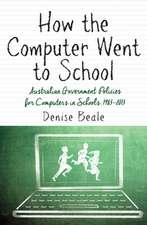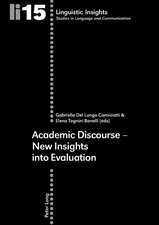Educating for Peace in a Time of Permanent War: Are Schools Part of the Solution or the Problem?: Routledge Research in Education
Editat de Paul R. Carr, Brad J. Porfilioen Limba Engleză Paperback – 8 iul 2013
| Toate formatele și edițiile | Preț | Express |
|---|---|---|
| Paperback (1) | 485.25 lei 6-8 săpt. | |
| Taylor & Francis – 8 iul 2013 | 485.25 lei 6-8 săpt. | |
| Hardback (1) | 1228.43 lei 6-8 săpt. | |
| Taylor & Francis – 16 mai 2012 | 1228.43 lei 6-8 săpt. |
Din seria Routledge Research in Education
-
 Preț: 310.29 lei
Preț: 310.29 lei -
 Preț: 304.19 lei
Preț: 304.19 lei -
 Preț: 303.18 lei
Preț: 303.18 lei -
 Preț: 147.15 lei
Preț: 147.15 lei -
 Preț: 276.13 lei
Preț: 276.13 lei -
 Preț: 302.17 lei
Preț: 302.17 lei -
 Preț: 303.75 lei
Preț: 303.75 lei -
 Preț: 290.73 lei
Preț: 290.73 lei -
 Preț: 310.31 lei
Preț: 310.31 lei - 8%
 Preț: 381.60 lei
Preț: 381.60 lei -
 Preț: 304.83 lei
Preț: 304.83 lei -
 Preț: 377.85 lei
Preț: 377.85 lei -
 Preț: 401.01 lei
Preț: 401.01 lei -
 Preț: 310.65 lei
Preț: 310.65 lei -
 Preț: 303.89 lei
Preț: 303.89 lei -
 Preț: 129.83 lei
Preț: 129.83 lei -
 Preț: 310.08 lei
Preț: 310.08 lei -
 Preț: 310.22 lei
Preț: 310.22 lei -
 Preț: 294.39 lei
Preț: 294.39 lei - 8%
 Preț: 381.99 lei
Preț: 381.99 lei - 9%
 Preț: 867.43 lei
Preț: 867.43 lei - 9%
 Preț: 1003.95 lei
Preț: 1003.95 lei -
 Preț: 303.89 lei
Preț: 303.89 lei -
 Preț: 358.67 lei
Preț: 358.67 lei - 8%
 Preț: 389.47 lei
Preț: 389.47 lei - 18%
 Preț: 1060.52 lei
Preț: 1060.52 lei - 18%
 Preț: 1116.74 lei
Preț: 1116.74 lei -
 Preț: 397.75 lei
Preț: 397.75 lei - 18%
 Preț: 1221.80 lei
Preț: 1221.80 lei - 18%
 Preț: 1110.74 lei
Preț: 1110.74 lei - 18%
 Preț: 1053.92 lei
Preț: 1053.92 lei - 18%
 Preț: 1162.84 lei
Preț: 1162.84 lei - 18%
 Preț: 1063.65 lei
Preț: 1063.65 lei - 28%
 Preț: 851.82 lei
Preț: 851.82 lei - 18%
 Preț: 1054.75 lei
Preț: 1054.75 lei - 18%
 Preț: 1054.58 lei
Preț: 1054.58 lei - 18%
 Preț: 1178.85 lei
Preț: 1178.85 lei - 18%
 Preț: 1111.72 lei
Preț: 1111.72 lei - 18%
 Preț: 1057.75 lei
Preț: 1057.75 lei -
 Preț: 489.03 lei
Preț: 489.03 lei - 18%
 Preț: 1059.14 lei
Preț: 1059.14 lei - 18%
 Preț: 1050.09 lei
Preț: 1050.09 lei - 18%
 Preț: 1060.52 lei
Preț: 1060.52 lei - 18%
 Preț: 1062.98 lei
Preț: 1062.98 lei - 18%
 Preț: 1056.28 lei
Preț: 1056.28 lei - 18%
 Preț: 1217.63 lei
Preț: 1217.63 lei - 18%
 Preț: 1060.19 lei
Preț: 1060.19 lei - 18%
 Preț: 1170.84 lei
Preț: 1170.84 lei - 18%
 Preț: 1167.36 lei
Preț: 1167.36 lei
Preț: 485.25 lei
Nou
Puncte Express: 728
Preț estimativ în valută:
92.86€ • 100.84$ • 78.01£
92.86€ • 100.84$ • 78.01£
Carte tipărită la comandă
Livrare economică 22 aprilie-06 mai
Preluare comenzi: 021 569.72.76
Specificații
ISBN-13: 9780415712224
ISBN-10: 041571222X
Pagini: 318
Ilustrații: 1 black & white tables, 7 black & white halftones
Dimensiuni: 152 x 229 mm
Greutate: 0.52 kg
Ediția:1
Editura: Taylor & Francis
Colecția Routledge
Seria Routledge Research in Education
Locul publicării:Oxford, United Kingdom
ISBN-10: 041571222X
Pagini: 318
Ilustrații: 1 black & white tables, 7 black & white halftones
Dimensiuni: 152 x 229 mm
Greutate: 0.52 kg
Ediția:1
Editura: Taylor & Francis
Colecția Routledge
Seria Routledge Research in Education
Locul publicării:Oxford, United Kingdom
Public țintă
Postgraduate and UndergraduateCuprins
Preface: In Search of Peace in a Culture of War Antonia Darder. Acknowledgments. 1. Introduction: Framing Peace and War Within the Educational Project: Willful (Dis)Engagement and Meaning (and Cost) of Conflict Paul R. Carr and Brad J. Porfilio Section I: Theorizing Peace, War and Peace 2. Militaristic Privilege in Schools and Beyond: Challenges for Peace Educators Laura L. Finley 3. Saying "No!": The Power of Transformative Learning Ilhan Kucukaydin and Patricia Cranton 4. "Why Do Students Call Me ‘The War Teacher?" Problematizing Militarism in Education as a Freireian Codification Mike Klein 5. Re-Examining the Role of Intellectuals in Times of War Through the Lens of Edward Said’s Work: A Call for Action to Social Justice Educators Pierre W. Orelus Section II: Scanning the War in Our Daily (and Educational) Lives 6. A Pedagogy of Ceaseless War: JROTC and the Military Occupation of US Schools Shannon K. McManimon, Brian D. Lozenski and Zachary A. Casey 7. The Way of the Soldier – Jarheads and Hurt Lockers: Perpetual War, Identity and Critical Media Literacy William M. Reynolds Section III: The Curriculum of War and Peace 8. Moving from a Curriculum of Compliance to a Curriculum of Possibility: Militarization of Schools, State Curricular Standards, and Creating Democratic Spaces for Teaching Military Conflict Christopher Leahey 9. The Military-Industrial-University Complex and Social Science: A Brief history and Current Update of a Professional Contribution to War Randle W. Nelsen 10. Art and Culturally Relevant Pedagogy vs. Warring Words in a Race to the Frontline Mary F. Wright, Brenda M. Wright and Matthew P. McMillan Section IV: Internationalizing Peace and the Trauma of War and Conflict 11. Who Owns Education for Peace and for War? Peace/War Industry and Ethnic Stratification: The Case of One Underprivileged School in Israel Dalya Yafa Markovich 12. Open the Doors, Paint the Walls and Ignore the Bells: Refashioning the Post-Movimiento Classroom to Foment "Civic Space" Ties Stephen T. Sadlier and Ignacio Rogelio Morales Sánchez 13. Swimming Against the Current: Educating for Peace in the University Classroom in Turkey Antonia Mandry Section V: Resisting the Militarization of Education 14. Building a Movement: Counter-Recruitment Organizing in US Public Schools Seth Kershner and Scott Harding 15. Creating Peaceful and Nonviolent Schools in the Midst of a Culture of War and Violence Tom Cavanagh 16. War and the Sectarian Mind: Education and the Development of Consciousness in the Age of "Permanent War" John M. Elmore. Afterword: Reflecting on Critical Perspectives of Peace Education Zvi Bekerman
Recenzii
"The doomsday clock moves closer to midnight in a world that has gone mad with violence and perpetual war. The power of the military to manufacture and sanitize death, devastation and destruction has never been interrogated before by critical educators. Educating for Peace in a Time of Permanent War: Are Schools Part of the Solution or the Problem? is the first volume of its kind in which the militarization of education (both in curriculum and in the larger pedagogical order) is examined. This is an extremely important book that should be read by all educators."
- Karen Anijar, Professor Emeritus, Arizona State University
"In Educating for Peace in a Time of Permanent War" Are Schools Part of the Solution or the Problem?, editors Paul R. Carr and Brad J. Porfilio skillfully weave together and present the intellectual capital (the theory, philosophy and empirical work) of a set of international scholars par excellence. In five engaging sections – 'Theorizing Peace, War and Peace'; 'Scanning the War in Our Daily (and Educational) Lives'; 'The Curriculum of War and Peace'; 'Internationalizing Peace and the Trauma of War and Conflict'; and, 'Resisting the Militarization of Education' – and contextualized between the inspiring bookends of a Foreword by Antonia Darder and an Afterword by Zvi Bekerman, the authors explore virtually every aspect of the role of education in the drive for war and its perpetuation, and its equally liberatory potential in perusing its antithesis, peace. Any activist, student or academic working in the areas of peace, education, sociology, social justice or anti-imperialism – or anyone excited about the current world-wide push-back against the forces of oppression (neo-liberalism, authoritarianism, sexism, racism and homophobia) – would be remiss not to carefully read and consider the important thoughts and analyses proffered in this strikingly important volume!"
- Marc Pruyn, Senior Lecturer, Monash University
"In our shadowed time of military solutions to chronic problems, schools themselves mirror these means toward an end. The authors in this volume critically assess the role of schooling as a tool of governments and nation-building through analysis of the military mind and militarism in our teaching and learning. They find in the efficiency and surveillance of a modern nation-state a cast of mind and a portfolio of practices that seep inexorably down to authoritarian accountability measures in many schools today. I was particularly struck to realize that common means of peace education may be too weak or incomplete to counter the military mind and its accepted solutions to conflict, especially when the war machine becomes a major means to economic prosperity. The part of this volume devoted to classroom practices by critical peace educators around the world gave me some hope that teaching and learning in and out of schools may someday become generative, rather than reactive, incubators for a new life. This new life would be a way of being in the world that is not simply an altered cast of mind or an amended outlook. It would be a culture of peace-building that would begin to counter the suspicion of our relationships with one another, the violence of modes of being with non-human animals, and the exploitation of our planet."
- A. G. Rud, Dean and Professor, Washington State University
"The significance of this book is that, by contrasting with education for war, it offers optimism about the potential of education for peace by presenting concrete examples of alternatives, which indicate possible changes in perceptions of and attitudes towards war...The book conveys one coherent voice in problematizing the role of education in militarization and in proposing ways of demilitarizing and shifting education towards a path to peace."
-Noriko Sakade, Cambridge University
- Karen Anijar, Professor Emeritus, Arizona State University
"In Educating for Peace in a Time of Permanent War" Are Schools Part of the Solution or the Problem?, editors Paul R. Carr and Brad J. Porfilio skillfully weave together and present the intellectual capital (the theory, philosophy and empirical work) of a set of international scholars par excellence. In five engaging sections – 'Theorizing Peace, War and Peace'; 'Scanning the War in Our Daily (and Educational) Lives'; 'The Curriculum of War and Peace'; 'Internationalizing Peace and the Trauma of War and Conflict'; and, 'Resisting the Militarization of Education' – and contextualized between the inspiring bookends of a Foreword by Antonia Darder and an Afterword by Zvi Bekerman, the authors explore virtually every aspect of the role of education in the drive for war and its perpetuation, and its equally liberatory potential in perusing its antithesis, peace. Any activist, student or academic working in the areas of peace, education, sociology, social justice or anti-imperialism – or anyone excited about the current world-wide push-back against the forces of oppression (neo-liberalism, authoritarianism, sexism, racism and homophobia) – would be remiss not to carefully read and consider the important thoughts and analyses proffered in this strikingly important volume!"
- Marc Pruyn, Senior Lecturer, Monash University
"In our shadowed time of military solutions to chronic problems, schools themselves mirror these means toward an end. The authors in this volume critically assess the role of schooling as a tool of governments and nation-building through analysis of the military mind and militarism in our teaching and learning. They find in the efficiency and surveillance of a modern nation-state a cast of mind and a portfolio of practices that seep inexorably down to authoritarian accountability measures in many schools today. I was particularly struck to realize that common means of peace education may be too weak or incomplete to counter the military mind and its accepted solutions to conflict, especially when the war machine becomes a major means to economic prosperity. The part of this volume devoted to classroom practices by critical peace educators around the world gave me some hope that teaching and learning in and out of schools may someday become generative, rather than reactive, incubators for a new life. This new life would be a way of being in the world that is not simply an altered cast of mind or an amended outlook. It would be a culture of peace-building that would begin to counter the suspicion of our relationships with one another, the violence of modes of being with non-human animals, and the exploitation of our planet."
- A. G. Rud, Dean and Professor, Washington State University
"The significance of this book is that, by contrasting with education for war, it offers optimism about the potential of education for peace by presenting concrete examples of alternatives, which indicate possible changes in perceptions of and attitudes towards war...The book conveys one coherent voice in problematizing the role of education in militarization and in proposing ways of demilitarizing and shifting education towards a path to peace."
-Noriko Sakade, Cambridge University
Descriere
Little is done in schools at the formal and informal levels to address war and peace, especially in relation to what can and should be done to bring about peace. This volume seeks to provide a range of policy, pedagogical, curriculum and institutional analyses aimed at facilitating meaningful engagement toward a more robust and critical examination of the role that schools play in framing war, militarization and armed conflict.


